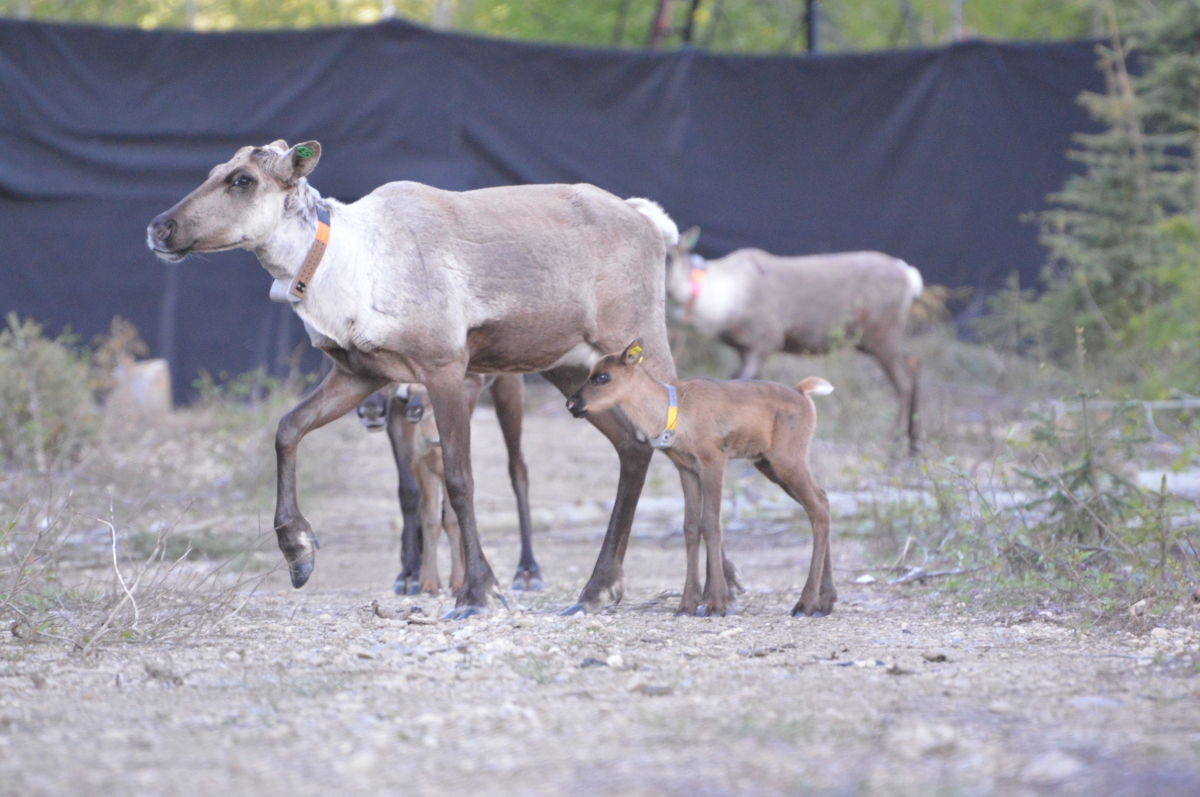Southern Mountain Caribou Rearing in the Wild
 Southern mountain caribou are woodland caribou that are behaviorally adapted to the deep snowpacks of southeastern British Columbia. Due to their low numbers, decreasing population trend, and shrinking and fragmented distribution, these caribou are listed as threatened under the federal Species at Risk Act and were red‐listed by the British Columbia Conservation Data Centre in 2002.
Southern mountain caribou are woodland caribou that are behaviorally adapted to the deep snowpacks of southeastern British Columbia. Due to their low numbers, decreasing population trend, and shrinking and fragmented distribution, these caribou are listed as threatened under the federal Species at Risk Act and were red‐listed by the British Columbia Conservation Data Centre in 2002.
Implementation of recovery options under the Province’s Mountain Caribou Recovery Implementation Plan has likely contributed to the relative stability observed for the Columbia North subpopulation near Revelstoke. However, even though pregnancy rates are consistently high (approx. 90%) the number of calves surviving to 10 months of age has not been sufficient to sustain this subpopulation.
In 2012, a group of Revelstoke community stakeholders and Provincial staff identified that the timing was right to implement a maternity penning trial within the home range of the Columbia North subpopulation. Maternity penning involves placing pregnant female caribou in a secure enclosure in late winter (end of March) where calving can occur in the absence of predators. Under 24/7 care by on-site First Nations shepherds, calves and their moms are held until the youngest calf is at least 2-3 weeks old after which all animals are released back into the wild, typically by mid-July. This method not only increases calf survival by protecting calves during the riskiest part of their lives, it also protects adults when predation mortality rates are typically at their peak.
In early 2013 the Revelstoke Caribou Rearing in the Wild Society (RCRW) was legally established. This grass roots community-led model would allow the broad cross-section of stakeholders, who all have a vested interest in mountain caribou recovery, to work together to guide and steer the project through its 5 year trial period. Stakeholders involved with the project, including representation on the RCRW Board of Directors, are the Splatsin First Nation, the Revelstoke Community Forest Corporation, Mica Heli Guides, HeliCat Canada, the North Columbia Environmental Society, the Revelstoke Snowmobile Club, the Columbia Mountains Caribou Research Project, Parks Canada as well as the Ministry of Forests, Lands and Natural Resource Operations. By the fall of 2013 RCRW had already acquired enough seed money to construct a suitable penning facility valued at over $150,000. To date the RCRW non-profit society has raised in excess of $1 million for their project. Major funders include the Government of Canada as part of the National Conservation Plan, Shell Canada, Columbia Basin Trust, Columbia Basin Fish and Wildlife Compensation Program, the Province of BC, Parks Canada, as well as the Habitat Conservation Trust Foundation.
For the 2014 and 2015 cycles, RCRW achieved its goal of doubling calf survival to 10 months of age with a combined survival rate of 46% (wild is approx. 22%). To date RCRW has penned a total of 40 adult female caribou who have birthed 35 calves in the pen. Calf survival results for 2016 are pending as release just occurred on July 17th. If success continues into years 3-5 of the trial RCRW will begin to pen approximately 20 adults/year in order to make a population level difference with the goal of having the Columbia North mountain caribou subpopulation self-sustaining over the long term.
The RCRW project is not only assisting with the recovery of mountain caribou, it is fostering strong partnerships and working relationships with First Nations and stakeholders.
